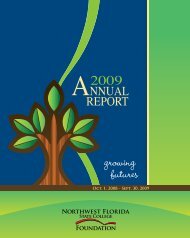Northwest Florida State College RN to BSN Nursing Program
Northwest Florida State College RN to BSN Nursing Program
Northwest Florida State College RN to BSN Nursing Program
You also want an ePaper? Increase the reach of your titles
YUMPU automatically turns print PDFs into web optimized ePapers that Google loves.
the onsite resource room.) Subsequent years should follow a similar pattern of revenues and<br />
expenses. Using the traditional <strong>Florida</strong> funding mechanisms, when enrollment grows, revenues<br />
should increase proportionate <strong>to</strong> an increase in student numbers; fixed expenses remain relatively<br />
constant, with variable expenses increasing proportionately. Once a program has been approved<br />
by the <strong>Florida</strong> <strong>State</strong> Board of Education, it will continue <strong>to</strong> receive state support through the<br />
standard legislative appropriation process, as long as enrollments and completions are viable.<br />
<strong>Program</strong> level involvement in budget development adds <strong>to</strong> the efficacy of the financial<br />
support. At NWFSC, the college-wide budgeting process is an open, “bot<strong>to</strong>m upward” rather<br />
than “<strong>to</strong>p downward” process. Early each spring term, the associate dean and the program<br />
direc<strong>to</strong>r in consultation with faculty and staff, review the prior year’s expenditures, evaluate new<br />
and continuing program needs, and then submit a budget request. At the same time, the program<br />
faculty and staff prepare a prioritized equipment and software request. These requests are<br />
submitted through the Office of Instruction <strong>to</strong> the <strong>College</strong> Budget Committee. While program<br />
requests for operating funds must comply with institutional budget development guidelines, the<br />
program always has the opportunity <strong>to</strong> submit “new issues” for consideration. Equipment,<br />
software, and new issues are prioritized at the program level <strong>to</strong> ensure that the decisions are<br />
made using the wisdom of the subject/program area experts. For the past two years, the<br />
program direc<strong>to</strong>r has served as an academic representative <strong>to</strong> the <strong>College</strong> Budget Committee and<br />
has become familiar with the full budgeting process.<br />
Facilities<br />
All facilities-related activities for the last five years have been specifically tailored not<br />
only <strong>to</strong> accommodate immediate needs, but also <strong>to</strong> anticipate future upper and lower division<br />
programming. This foresight is characterized by several fac<strong>to</strong>rs, including: a) constructing new<br />
facilities <strong>to</strong> university standards (e.g. the Niceville LRC and Science Technology Buildings), b)<br />
designing specialized program facilities <strong>to</strong> meet shared, multi-purpose uses (e.g. the collegiate<br />
high school houses high school students by day and college students by night), c) proactive<br />
coordination with city, state, and county offices <strong>to</strong> ensure infrastructure issues such as power,<br />
water management, and traffic control <strong>to</strong> anticipate future concerns, and d) partnering with other<br />
public and private entities <strong>to</strong> leverage and maximize construction funding (e.g. the Arts Center<br />
<strong>Northwest</strong> <strong>Florida</strong> <strong>State</strong> <strong>College</strong> Self-Study Report for the <strong>BSN</strong> <strong>Program</strong>, August 20, 2008 Page 23 of 59


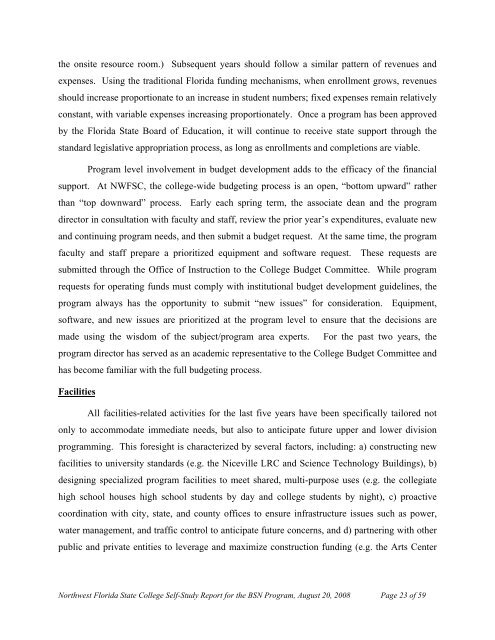
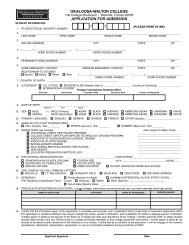

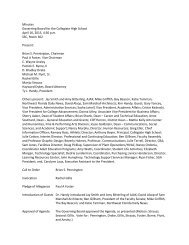
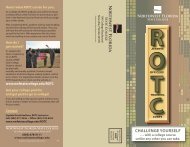

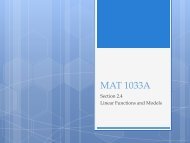
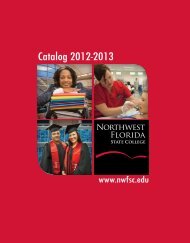
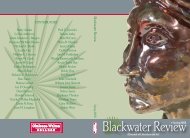
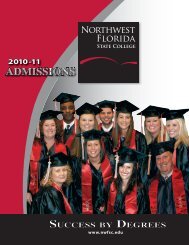
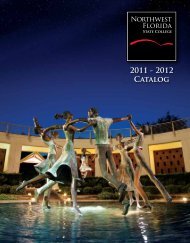
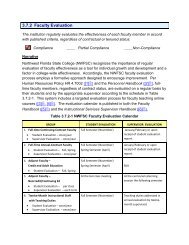

![Fall 2013 Schedule of Classes [pdf] - Northwest Florida State College](https://img.yumpu.com/30770057/1/190x200/fall-2013-schedule-of-classes-pdf-northwest-florida-state-college.jpg?quality=85)
